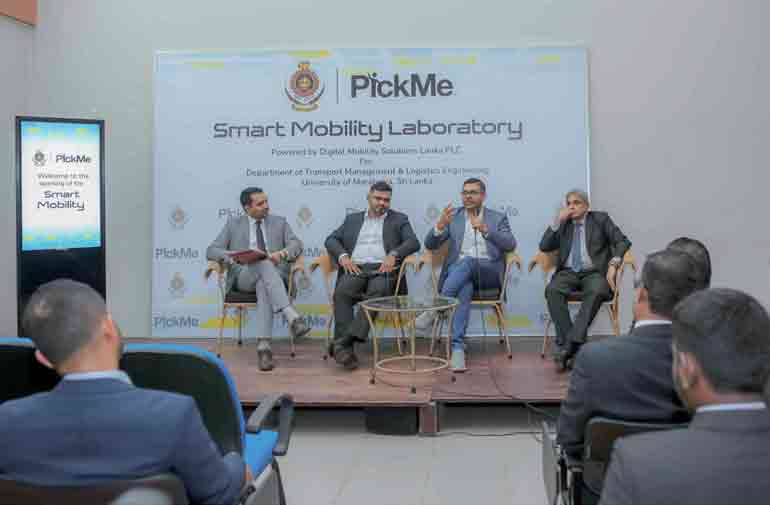Tuesday Feb 24, 2026
Tuesday Feb 24, 2026
Friday, 29 August 2025 02:15 - - {{hitsCtrl.values.hits}}

PickMe, has entered into a landmark research collaboration with the University of Moratuwa in a move that could redefine the future of homegrown technology innovation in the country.
This partnership marks a strategic shift away from the prevailing model of adapting foreign technologies, focusing instead on developing solutions designed specifically for the Sri Lankan context.
The collaboration aims to address long-ignored mobility challenges across diverse segments of the population. With a population of 22 million people facing a wide range of mobility needs, from rural villages with unmarked roads to urban centres with complex traffic dynamics, PickMe and the University of Moratuwa are seeking to design scalable, locally relevant solutions. This includes tackling issues such as optimising transport in areas with limited GPS-based map coverage, designing user interfaces for low-literacy communities, and integrating multiple modes of transport, such as buses, trains, and three-wheelers into a unified mobility ecosystem through technology.
PickMe CEO Jiffry Zulfer said: “As PickMe moves into the next stage of its development, connecting the dots across the shared economy, our need extends beyond the data we collect and analyse daily. What we require now is qualitative analysis and research, and this is where universities like Moratuwa can play a vital role. We need the human element: the ability to dig deeper into the behavioural patterns of society, to bring innovative thinking, and to help us understand the directions in which citizens of Sri Lanka are seeking solutions to improve their lives.”
The initiative is grounded in business strategy rather than corporate social responsibility. Having already established leadership in the traditional ride-hailing market, PickMe is now looking to deepen its reach by serving underrepresented demographics.
The partnership gives the company access to advanced research capabilities without the operational overhead of building a standalone R&D division, while the university benefits from real-world application for its academic work—a frequent challenge in Sri Lanka’s research landscape.

University of Moratuwa Department of Transport Management and Logistics Engineering Head Prof. Niles Perera said: “We sincerely appreciate PickMe for their invaluable collaboration in modernising our student space and supporting the establishment of our Smart Mobility Laboratory. Our collaboration exemplifies industry–academia partnership, fostering innovation, creativity, and practical learning. This initiative empowers our students to explore future mobility solutions while strengthening Sri Lanka’s technological advancement journey.”
By leveraging the intellectual strengths of one of Sri Lanka’s top engineering institutions, PickMe is positioning itself to pioneer solutions that not only serve local users but also hold potential for global replication in other developing nations. The challenges being addressed, such as limited connectivity, infrastructure constraints, and diverse user needs, are common across much of the Global South. The opportunity to develop and export these solutions puts Sri Lanka in a unique position to lead rather than follow in the global innovation race.
This partnership also signals a shift in how Sri Lankan businesses and academic institutions can work together to drive progress. If successful, it may inspire other companies to view university collaborations not as charitable ventures, but as essential to commercial competitiveness. Policymakers, too, may begin to see such models as vital to economic growth and long-term national resilience.
While the collaboration faces inevitable challenges, including managing intellectual property, aligning timelines, and ensuring scalability, it represents a bold step toward transforming Sri Lanka into a producer of innovation rather than just an adopter. For PickMe, the University of Moratuwa, and potentially the nation, this initiative offers a compelling example of what can be achieved when local insight, technical expertise, and strategic ambition align.